April 2025
The global automotive engine market is anticipated to grow from USD 133.53 billion in 2024 to USD 244.28 billion by 2034, with a compound annual growth rate (CAGR) of 6.53% during the forecast period from 2025 to 2034.
Unlock Infinite Advantages: Subscribe to Annual Membership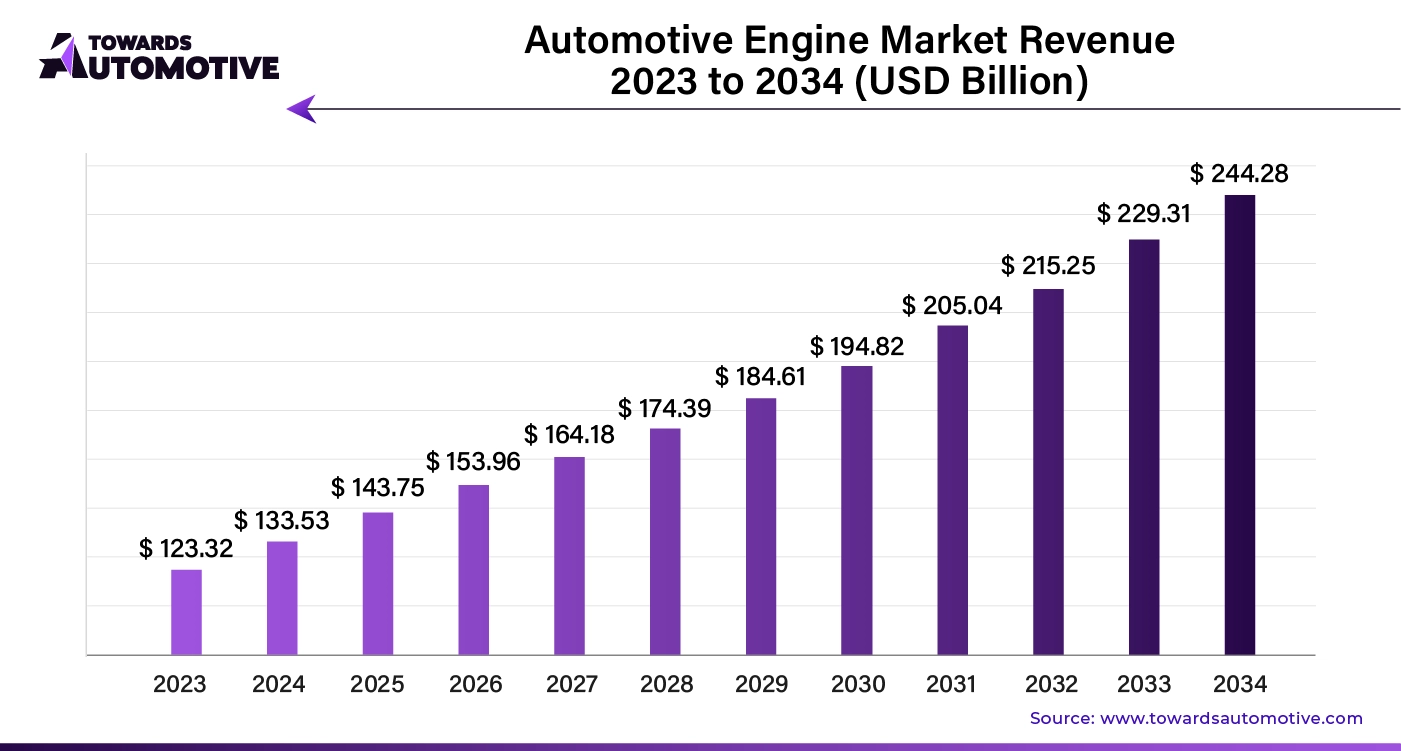
The automotive engine is a cornerstone of vehicle performance and innovation, representing a complex blend of engineering, technology, and power generation. As the primary source of propulsion, automotive engines convert fuel into mechanical energy, enabling vehicles to move and function. Over the decades, automotive engines have evolved significantly, reflecting advancements in technology and changing consumer preferences. The evolution from traditional internal combustion engines (ICE) to hybrid and electric powertrains illustrates the industry's shift towards more efficient, environmentally friendly solutions.
Modern automotive engines are characterized by their increased efficiency, reduced emissions, and enhanced performance. Innovations such as turbocharging, variable valve timing, and direct fuel injection have significantly improved engine power output and fuel efficiency, while also addressing environmental concerns. The growing emphasis on reducing the carbon footprint has spurred the development of alternative powertrains, including hybrids and electric engines, which promise lower emissions and better fuel economy.
Additionally, the integration of advanced technologies such as electronic control units (ECUs), artificial intelligence, and advanced diagnostics systems has revolutionized engine management, leading to better performance, reliability, and fuel efficiency. As automotive manufacturers and consumers increasingly prioritize sustainability and technological innovation, the automotive engine continues to be a focal point of research and development, shaping the future of mobility and contributing to the broader goals of environmental stewardship and energy efficiency.
Artificial Intelligence (AI) plays a transformative role in the automotive engine market, driving innovation and enhancing various aspects of engine design, performance, and maintenance. AI algorithms analyze vast amounts of data from engine sensors to optimize performance parameters. This includes adjusting fuel injection rates, ignition timing, and air-fuel mixtures in real-time to improve fuel efficiency, power output, and emission control. AI-driven engine control units (ECUs) can adapt to changing driving conditions and driver behaviors, ensuring optimal engine performance and efficiency.
AI-powered predictive maintenance systems use data from engine diagnostics to foresee potential issues before they become critical. By analyzing historical data and identifying patterns, AI can predict component failures, schedule timely maintenance, and reduce unexpected breakdowns. This proactive approach helps in extending the engine’s lifespan and minimizing downtime.
AI enhances the accuracy and speed of engine diagnostics. Machine learning models can quickly analyze diagnostic data, identify issues, and suggest solutions. This reduces the time required for troubleshooting and repairs, improving the overall reliability and serviceability of automotive engines.
In the design phase, AI aids in optimizing engine components and systems through simulation and modeling. AI algorithms can analyze numerous design variables and predict performance outcomes, leading to more efficient and innovative engine designs. This accelerates the development process and allows for the creation of more advanced and efficient engines.
The rising demand for commercial vehicles is a major driver of growth in the automotive engine market, influencing advancements in engine technology and performance. As global economies expand and industries such as logistics, construction, and public transportation evolve, the need for efficient, durable, and high-performance commercial vehicles has surged. This growing demand is prompting automotive manufacturers to invest heavily in developing advanced engine technologies that meet the specific requirements of commercial applications.
Commercial vehicles, including trucks, buses, and vans, are essential for the transportation of goods and passengers, and their operational efficiency directly impacts business performance. To address this demand, manufacturers are focusing on enhancing engine capabilities to offer improved fuel efficiency, higher power output, and lower emissions. Innovations such as turbocharging, advanced fuel injection systems, and hybrid powertrains are being integrated to ensure that commercial vehicles can handle heavy loads and long distances while maintaining optimal performance and regulatory compliance.
Additionally, the rise of e-commerce and the shift towards sustainable transportation solutions are driving further advancements in engine technology. Electric and hybrid engines are becoming increasingly popular for commercial vehicles as they offer reduced operating costs and lower environmental impact. The automotive engine market is thus experiencing a significant transformation, driven by the need to meet the evolving demands of commercial vehicles. This growth is shaping the future of engine design, performance, and sustainability in the automotive industry.
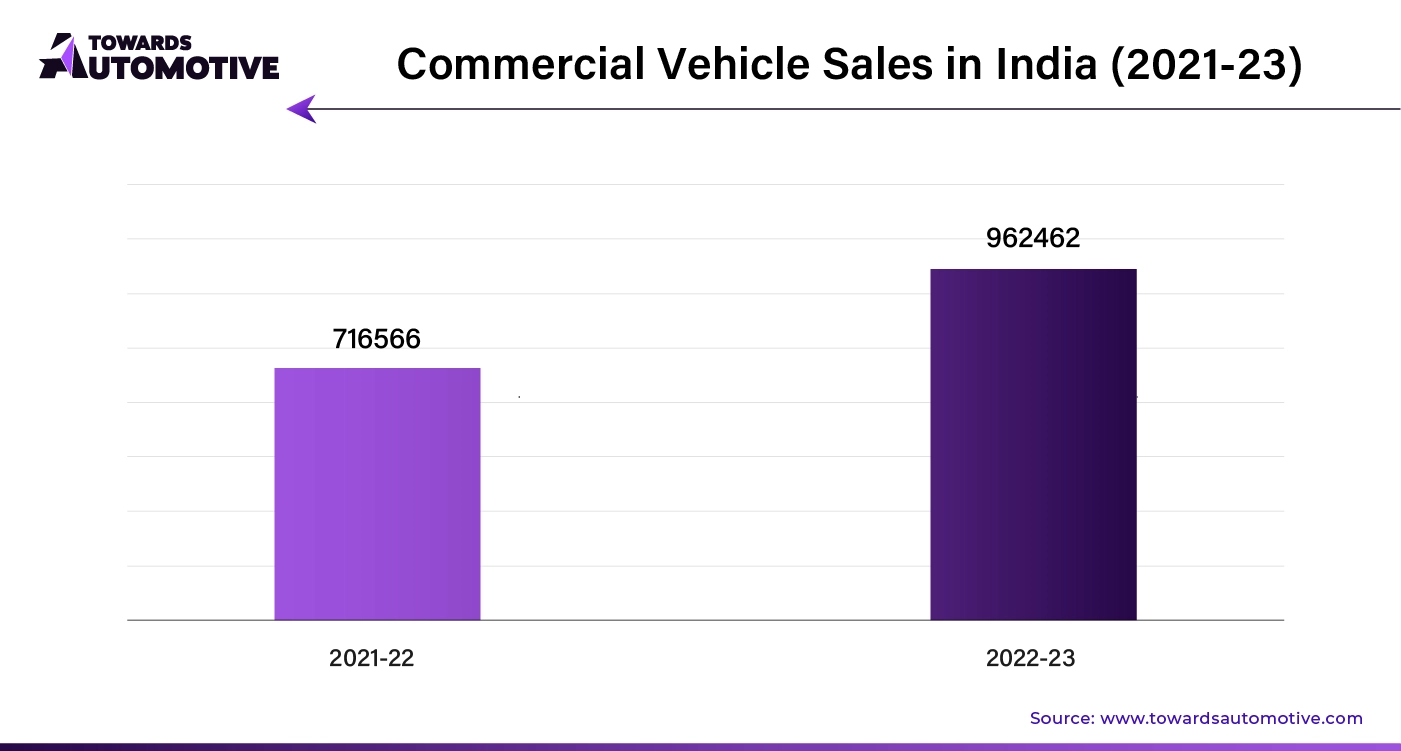
The automotive engine market faces several restraints that impact its growth and development. High production and development costs associated with advanced engine technologies and compliance with stringent emissions regulations can hinder market expansion. Additionally, the shift towards alternative powertrains, such as electric and hybrid engines, challenges traditional internal combustion engine (ICE) manufacturers. Supply chain disruptions and the rising complexity of engine systems also contribute to increased costs and maintenance challenges. Furthermore, fluctuating fuel prices and growing environmental concerns further drive the demand for cleaner alternatives, posing additional obstacles to the traditional automotive engine market.
Advanced internal combustion engines (ICE) are creating significant opportunities in the automotive engine market by driving innovations that enhance performance, efficiency, and sustainability. These cutting-edge engines integrate technologies such as turbocharging, direct fuel injection, and variable valve timing, which collectively improve fuel efficiency, power output, and overall engine responsiveness. By refining combustion processes and optimizing engine parameters, advanced ICEs meet increasingly stringent emissions regulations while delivering superior performance. Additionally, developments in alternative fuels and hybridization are expanding the capabilities of internal combustion engines, offering cleaner and more sustainable options without compromising on power. These advancements enable manufacturers to cater to diverse consumer needs, from high-performance sports cars to eco-friendly vehicles. As the automotive industry continues to evolve, the ongoing enhancements in internal combustion technology provide a crucial bridge between traditional engine designs and the growing demand for electric and hybrid vehicles. Consequently, advanced ICEs are pivotal in maintaining market competitiveness and meeting both regulatory and consumer expectations in a rapidly changing automotive landscape.
The passenger car segment held the largest share of the market. The passenger cars segment is a major driver of growth in the automotive engine market, significantly influencing engine technology and development. As the primary vehicle type for personal and family transportation, passenger cars drive demand for various engine innovations aimed at enhancing performance, fuel efficiency, and comfort. Advances in engine technology, such as turbocharging, direct fuel injection, and variable valve timing, are being driven by the need to meet consumer expectations for high performance and low emissions. Additionally, the rising popularity of hybrid and electric vehicles within the passenger car segment is pushing manufacturers to develop engines that integrate seamlessly with these new powertrains. This segment also fosters competition and innovation as automakers strive to differentiate their products through improved engine efficiency and advanced features. Furthermore, the demand for enhanced safety and driving experience in passenger cars propels advancements in engine control systems and diagnostics. As the automotive industry evolves, the passenger car segment continues to play a crucial role in shaping the future of engine technology, driving both growth and innovation in the automotive engine market.
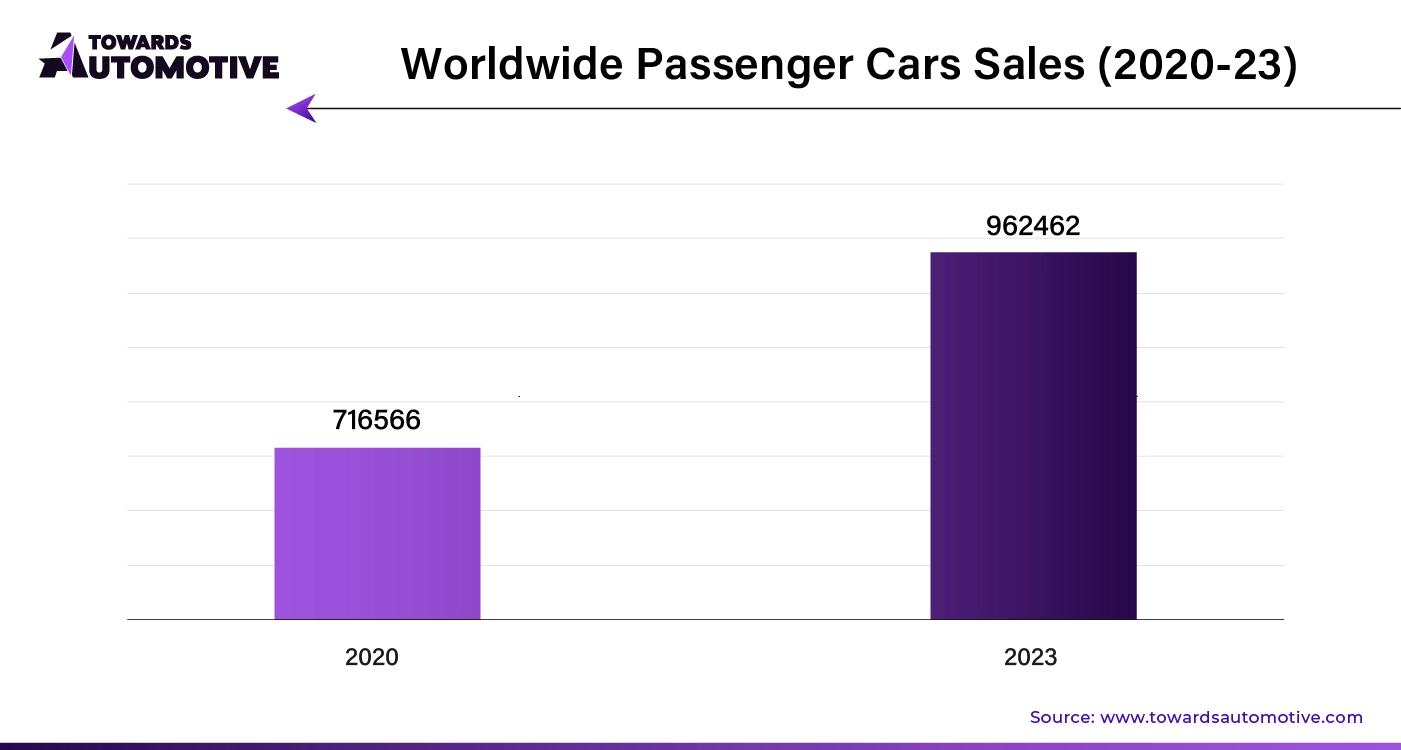
The gasoline segment dominated the industry. The gasoline segment is a significant driver of growth in the automotive engine market, fueling advancements in engine technology and performance. As one of the most widely used fuels in internal combustion engines, gasoline remains central to the automotive industry despite the rising popularity of alternative fuels. The demand for gasoline engines continues to be strong due to their proven reliability, performance, and cost-effectiveness. Innovations in gasoline engine technology, such as turbocharging, direct fuel injection, and advanced variable valve timing, are designed to enhance fuel efficiency, power output, and emissions control. Additionally, improvements in gasoline formulations and engine management systems are further driving the development of more efficient and environmentally friendly engines. The gasoline segment also supports a wide range of vehicle types, from everyday passenger cars to high-performance sports cars, thereby maintaining its prominent role in the market. As manufacturers strive to meet evolving regulatory standards and consumer preferences, the gasoline segment remains a key focus for technological advancements, contributing significantly to the growth and evolution of the automotive engine market.
North America dominated the automotive engine market. In North America, technological advancements, a strong automotive manufacturing base, and the increasing demand for passenger cars are key drivers of growth in the automotive engine market. Technological advancements, including innovations in turbocharging, direct fuel injection, and hybrid powertrains, are enhancing engine performance, fuel efficiency, and emissions control. These improvements are essential for meeting stringent regulatory standards and satisfying consumer expectations for high-performing, eco-friendly vehicles. The region’s robust automotive manufacturing base, home to major global automakers and suppliers, provides the necessary infrastructure and resources to support ongoing engine development and production. This well-established industry network facilitates the rapid adoption of new technologies and efficient scaling of manufacturing processes. Furthermore, the growing demand for passenger cars in North America, driven by rising consumer preferences for advanced features and better driving experiences, accelerates the need for cutting-edge engine solutions. As consumers seek vehicles with improved power, efficiency, and sustainability, automakers are investing heavily in engine technology to meet these demands. Together, these factors drive the automotive engine market’s expansion in North America, fostering innovation and maintaining the region’s competitive edge in the global automotive industry.
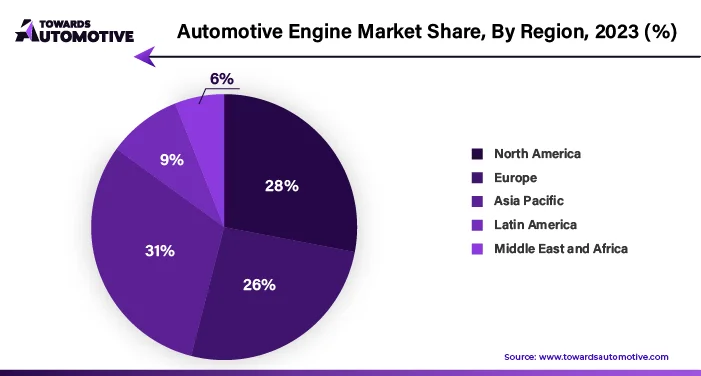
Asia Pacific is expected to expected grow with the highest CAGR during the forecast period. In the Asia Pacific region, rapid urbanization, economic growth, and increasing vehicle production are significant drivers of the automotive engine market's expansion. Rapid urbanization across emerging economies in Asia Pacific is spurring demand for both personal and commercial vehicles, as more people seek mobility solutions and infrastructure development accelerates. Concurrently, robust economic growth in countries such as China and India is boosting incomes and expanding the middle class, further increasing the demand for vehicles equipped with advanced engine technologies. Additionally, the region’s substantial increase in vehicle production, driven by both domestic consumption and export demands, necessitates the continual advancement and manufacturing of high-performance engines. This surge in production supports innovation in engine technology, including improvements in fuel efficiency, emissions control, and overall performance. As the automotive industry adapts to these trends, manufacturers in Asia Pacific are focusing on developing and implementing new engine technologies to meet evolving consumer preferences and regulatory standards. Collectively, these factors drive the growth of the automotive engine market in Asia Pacific, positioning the region as a key player in the global automotive industry.
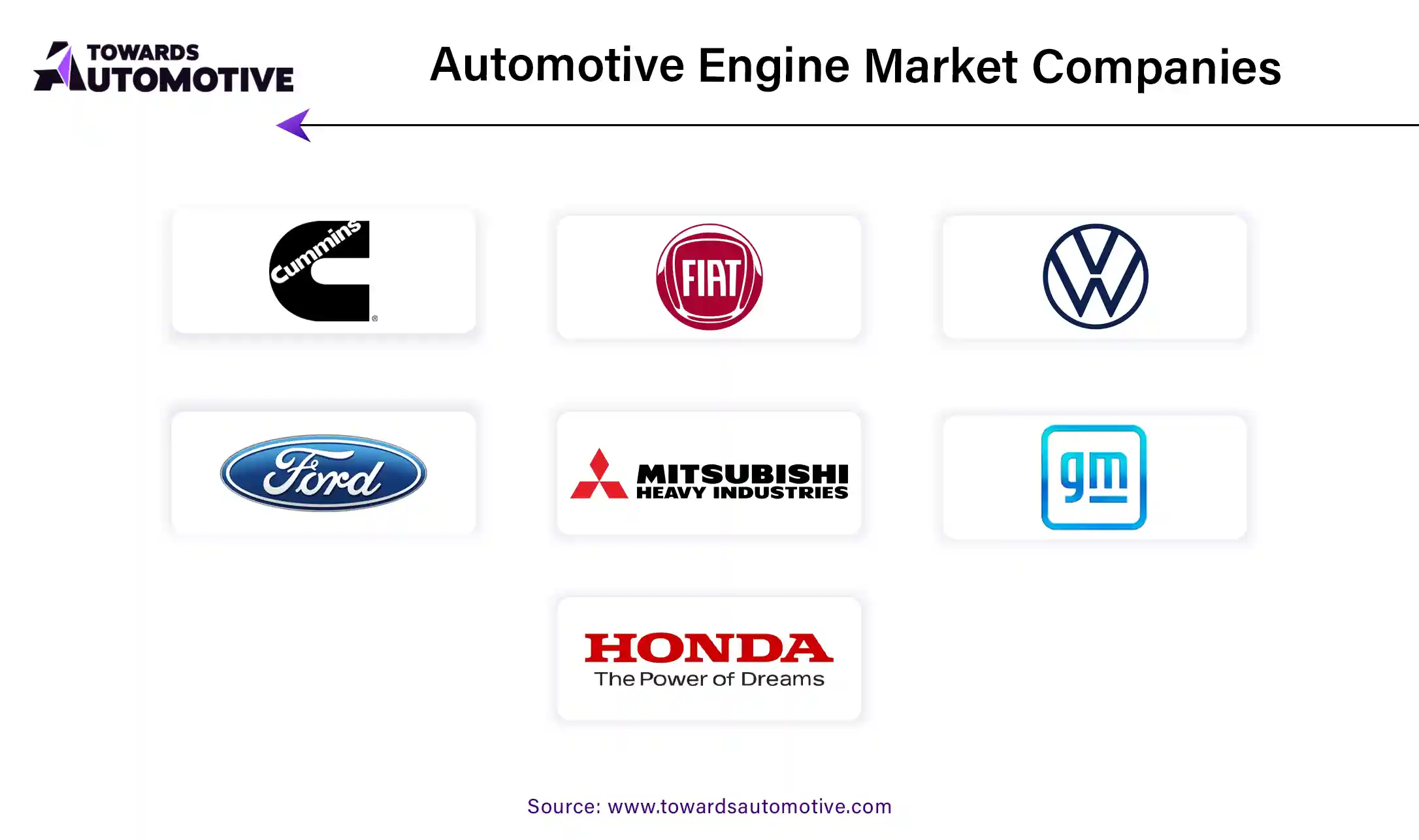
By Placement Type
By Fuel Type
By Region
April 2025
April 2025
April 2025
April 2025
We offer automotive expertise for market projections and customizable research, adaptable to diverse strategic approaches.
Contact Us